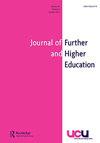The impact of pre-entry work experience on university students’ perceived employability
IF 2.4
Q1 EDUCATION & EDUCATIONAL RESEARCH
引用次数: 0
Abstract
ABSTRACT Much research on the employability development of university students and the employability experience of graduates treats learners as experientially homogenous and ignores the potential impact of pre-entry work experience on either students’ confidence or their employability-related behaviours. This study explored the confidence of commencing students aged 17 to 21. The objective was to understand whether and how study and career confidence differs among commencing students according to whether they have never worked, are working whilst studying, or have worked previously and have stopped work. The impact of work experience including that gained prior to university entry is often overlooked when discussing students’ perceived employability. This largely quantitative study explores the perceived employability of commencing university students who began their studies soon after finishing high school and compares these self-perceptions relative to work experience. The study employed a self-measure of study and career confidence (Bennett, 2021) grounded in social cognitive career theory with 2,374 full-time students. Differences across the categories were explored using t-tests and multivariate analysis. The analysis concluded that 1,272 students (53.6%) were working at the time of the study, 1,025 students (46.4%) had previously worked but were not working at the time of the study and 77 students (3.2%) had never worked. The findings, illustrated by students’ text-based descriptions of their employability development activities, suggest a hierarchical relationship between pre-entry work-experience and more confident self-perceptions of employability. Implications for higher education employability development are discussed.入职前工作经验对大学生感知就业能力的影响
摘要许多关于大学生就业能力发展和毕业生就业能力体验的研究将学习者视为经验同质的,忽略了入职前工作经验对学生信心或就业能力相关行为的潜在影响。这项研究探讨了17至21岁的新生的自信心。目的是了解初学学生的学习和职业信心是否以及如何根据他们是否从未工作过、在学习期间工作过、或以前工作过并已停止工作而有所不同。在讨论学生的就业能力时,工作经验(包括大学入学前的工作经验)的影响往往被忽视。这项主要是定量的研究探讨了高中毕业后不久就开始学习的大学生的就业能力,并将这些自我认知与工作经验进行了比较。该研究基于社会认知职业理论,对2374名全日制学生进行了学习和职业信心的自我测量(Bennett,2021)。使用t检验和多变量分析探讨了不同类别之间的差异。分析得出结论,1272名学生(53.6%)在研究时正在工作,1025名学生(46.4%)以前工作过,但在研究时没有工作,77名学生(3.2%)从未工作过。这些发现通过学生对其就业能力发展活动的基于文本的描述来说明,表明入职前的工作经历和对就业能力更有信心的自我认知之间存在等级关系。讨论了对高等教育就业能力发展的影响。
本文章由计算机程序翻译,如有差异,请以英文原文为准。
求助全文
约1分钟内获得全文
求助全文
来源期刊

JOURNAL OF FURTHER AND HIGHER EDUCATION
EDUCATION & EDUCATIONAL RESEARCH-
CiteScore
5.20
自引率
4.30%
发文量
80
期刊介绍:
Journal of Further and Higher Education is an international, peer-reviewed journal publishing scholarly work that represents the whole field of post-16 education and training. The journal engages with a diverse range of topics within the field including management and administration, teacher education and training, curriculum, staff and institutional development, and teaching and learning strategies and processes. Through encouraging engagement with and around policy, contemporary pedagogic issues and professional concerns within different educational systems around the globe, Journal of Further and Higher Education is committed to promoting excellence by providing a forum for scholarly debate and evaluation. Articles that are accepted for publication probe and offer original insights in an accessible, succinct style, and debate and critique practice, research, theory. They offer informed perspectives on contextual and professional matters and critically examine the relationship between theory and practice across the spectrum of further and higher education.
 求助内容:
求助内容: 应助结果提醒方式:
应助结果提醒方式:


